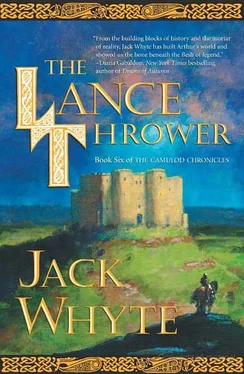“I’m well enough,” I answered and told him to come inside, alone, and close the door. As he obeyed, I said the first thing that had come into my mind, and my tone was chill, even to my own ears. “Pharus and Lars, behind you—they were still wrapped in their cloaks when you opened the door. And you, your hands are empty.”
He stood blinking at me in the dimness, too surprised by my words even to look about him. I gave him no time to respond. “I thought I had trained you better than that. Why did you come to the door?”
His lips moved several times before he could frame his words. “I … You had been in here a long time. I thought—”
“No, Clovis, you did not think. You came because you were concerned for me. Concerned that something might have befallen me. And what if something had? What if I had surprised an enemy in here and had been killed? You opened that door with no blade in your hand. That could have been the death of you, too. And Pharus and Lars might have died before they could even throw back their cloaks, let alone draw their swords. That kind of carelessness invites death.”
He stared at me for long moments, biting his lower lip gently, then nodded. “You’re right, Father.”
“I know I am. Now look about you, now that you are here. This is what we came to find.”
His guileless face registered renewed surprise, and I watched his eyes scan the tiny room, noting how they passed across the dusty bed and then wavered before snapping back to what he thought he had seen. I heard the sibilant hiss as he sucked in a shocked, sharp breath that stuck in his throat.
The figure on the cot, beneath the rumpled, dust-coated bedding of animal skins, had been dead for a long time. There was no way to tell how long, but all signs of putrefaction had long since dried up and withered into dust, leaving only a skeleton partially covered with scraps of dried skin. The vault of the rib cage was barely discernible beneath the coverings, and the hair that had once adorned the skull had fallen free and now lay scattered in wispy clumps like silken, ash white cobwebs. Clovis swallowed hard and licked his lips, vainly trying to moisten them, then looked sideways at me.
“Did you expect … this?”
I answered him without removing my gaze from the bald dome of the partly covered skull. “I had hoped otherwise, but I feel no surprise. He was an old man even when I last saw him, and that was nigh on twenty-five years ago. Had he lived until now, he would have been more than eighty years old.” I stepped toward the bed, avoiding the two large bundles that lay between it and me, and knelt on one knee, bending forward to remove the bearskin that covered the lower part of the skull, and as I lifted it to bare the smooth, almost toothless jaws, my mind supplied a memory of the face that had once covered these grinning bones. “Farewell, old friend,” I whispered, and covered his head completely. “We will bury you decently now.”
“Who was he, Father?”
I looked up at my youngest son, noting his hushed voice and seeing the curiosity and wonder in his wide eyes, and then I pushed myself to my feet and looked back again at the lumpy shapes of the bones beneath the bed skins.
“A friend, Clovis, and more than that, trusted above all others save one, yet trusted equally with that one. A dear and priceless friend, although his very name struck terror into other people’s souls. The man who fleshed these bones was a hero in the truest sense, greater than any hero you have ever dreamed of. Larger than life itself and more marvelous than any tale could tell of him.”
I stooped again and tucked the dusty coverings more securely around the ethereal form on the bed. “In addition to that, he was the sole man in Britain who had perhaps more integrity and honor than the King himself; a champion, born of the noblest blood of ancient Rome … as well as a teacher and a mentor greater than any I have ever known, including the blessed Germanus.” Again I straightened up, my eyes still fixed on the body’s outline. “Above all else, however, first and last, he was my friend, although he forced me to abandon all my friends and thereby saved my life. This is Merlyn, Clovis.”
I heard a strangled, gurgling gasp. My son’s face was now filled with fear and horror. “He was a leper!”
I fought to swallow my sudden, unreasonable anger. It was I myself who had told Clovis of the leprosy, but I had no control over the fear the very mention of the dread disease could generate. I willed myself to smile, disparaging his fear without demeaning him. “At least you didn’t say he was a sorcerer. Most people did, and many thought he was both: leper and sorcerer, cursed by Heaven.” The lad stood motionless, gazing at me wide-eyed, and I stepped closer to him, placing one arm about his shoulders and sweeping the other toward the bed. “He has been dead for years, Clovis, you can see that, so any threat of leprosy that ever was is long since gone. And he was never a sorcerer, despite what silly people say. You have nothing to fear from Merlyn, nor would you have were he alive and sitting here today, so take that awestruck look off your face. We have work to do here.”
My son swallowed and made an effort to empty his face of fear. “What kind of work, Father?”
“A burial, for one thing. And we have to make a litter to carry those.” I gestured to the two large bundles lying between us and the bed. “If you look, I think you’ll find they are for me.”
He blinked, frowning, then bent over to peer at the bundles before stretching out one hand to tug a small oblong package free from the leather strips that bound the larger. He held it up to his eyes, squinting in the gloom of the tiny room as his lips formed the letters of the single word written on it.
“ Hastatus? What does that mean?”
“It means I’m right. That was his name for me. It means spearman in the old Roman tongue.”
“No, that’s lancearius .”
“Aye, it is now, but a lancearius is a spear thrower and he’s a cavalryman, throwing from horseback. The old word was hastatus , and the hastatus was an infantryman. He held on to his spear. Had he thrown it, he would have left himself weaponless.”
Clearly mystified, Clovis frowned and held the package out to me. I took it, hefting it in my hand and gauging the weight of it as being equal to four, perhaps six sheets of parchment.
“Spearman,” he repeated, as though testing the sound of the word.
“Aye, Spearman. Sometimes he shortened it to Spear— Hasta.”
“I thought the old word for a spear was pilum.”
I glanced at him again and smiled slightly, surprised to hear that he had even heard of the weapon. “It was, but the pilum was a different kind of spear from the hasta, heavy and cumbersome with a long, thin iron neck—a rod that made up half the length of the thing. It was too heavy to throw far, a defensive weapon, designed to be thrust into an enemy’s shield. The pilum would bite deep and then the iron rod would bend and the weight of the thing would drag the man’s shield down, making it useless. The hasta, on the other hand, was a fighting spear, designed to be held by its wielder. Nowadays the lancearius uses a light throwing spear, a javelin. I used to be very good at throwing them myself, and that’s how I got the name. It’s a long story and someday I’ll tell you about it.
“In the meantime I want to read this, and I would like to be alone while I do it, so take those tools from the corner there, if you would, and set your friends to digging a grave by the lakeside … . Hold you, I have not finished.” He had nodded, accepting my instructions as I spoke them, and had immediately begun to turn away to collect the tools, but now he stopped and turned back to look at me again. “Pardon me, Father,” he said, “I thought you had dismissed me.”
Читать дальше









